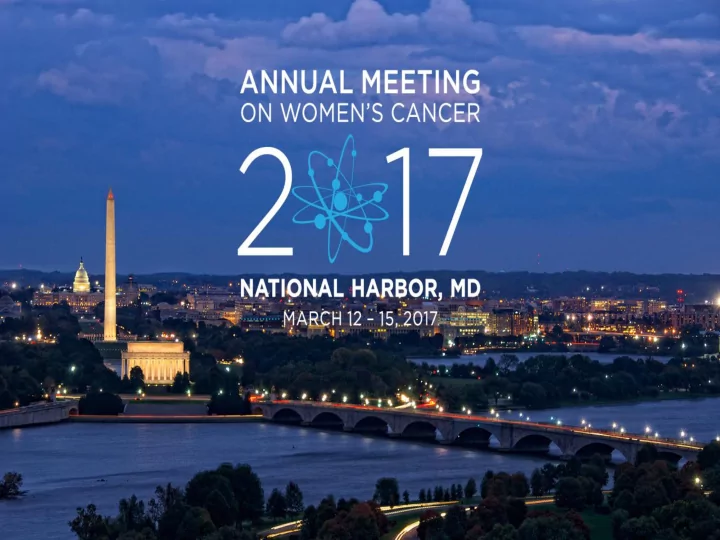

Complementary Medicine and Alternative Therapies J. Rebecca Liu, M.D. University of Michigan
VERBAL DISCLOSURE • Nothing to disclose
Overview • CAM and cancer • Diet • Acupuncture • Stress/Meditation • Patient perspective
Interest in complementary and alternative medicine is growing • Office of Alternative Medicine – FY 1992: $2.0 million – FY 1998: $19.5 million • National Center for Complementary and Integrative Health (formerly National Center for Complementary and Alternative Medicine) – FY 1999: $50.0 million – FY 2015: $124.1 million
National Center for Complementary and Integrative Health
Office of Cancer Complementary and Alternative Medicine (OCCAM) — within NCI • Established 1998 • FY 1998 $28 million • FY 2010 $105 million
Office of Cancer Complementary and Alternative Medicine (OCCAM) Research Sponsored by NCI (Extramural) Treatment • Shark Cartilage Extract Does Not Improve Lung Cancer Survival • UCLA: Low-fat, Fish Oil Diet Slows Growth of Prostate Cancer Cells • Jefferson University-led Team Studies High Dose Vitamin C for Advanced Pancreatic Cancer
Office of Cancer Complementary and Alternative Medicine (OCCAM) Research Sponsored by NCI (Extramural) • Supportive Care – Ginger Helps Reduce Nausea From Chemotherapy – New research suggests yoga may help with fatigue-related symptoms in breast cancer survivors – Acupuncture Reduces Joint Pain in Some Women With Breast Cancer
Office of Cancer Complementary and Alternative Medicine (OCCAM) Research Sponsored by NCI (Extramural Prevention • Low-Fat Diet May Reduce Risk of Breast Cancer Relapse • Vitamin E Supplements Ties to Increased Risk of Prostate Cancer • Harvard Study Finds Coffee Consumption Associated With Decreased Risk for Basal Cell Carcinoma • Natural Compounds Studied for Prevention of Colon Cancer
CAM use among GYO patients • January 2003 - January 2014 • 2508 women, response rate 21% • Demographics: white (93.5%), age > 50 years (76%) • 87% of participants used at least 1 CAM therapy during the previous 12 months. • biologically based approaches (83.5%) • mind and body interventions (30.6%), • body-based therapies (18.8%) • individual CAM therapies: vitamins and minerals (78%), herbal supplements (27.9%), spiritual healing and prayer (15.1%), and deep breathing relaxation exercises (13.1%). Int J Gynecol Cancer. 2015 Nov;25(9):1724-30.
CAM use among cancer patients • 17,639 patients • 87% of participants acknowledged CAM therapy use within the previous 12 months • Most common CAM modalities • biologically based approaches [83.67%] • mind-body interventions [26.45%] • manipulative and body-based therapies [22.56%] • alternative medical systems [2.69%] • energy therapies [1.7%] • CAM use was more prevalent among women, non-Hispanics, Caucasians, patients 60 to 69 years of age, and those who are married, have a higher level of education, and are employed (P < .005). Integr Cancer Ther. 2016 Jul 21
CAM use among cancer patients • CAM use: demographics • more prevalent among women • non-Hispanics, Caucasians, • Aged 60 to 69 years of age • Married • higher level of education • employed Integr Cancer Ther. 2016 Jul 21
Attit itudes towards CAM: : GYO care providers • Survey: Society of Gynecologic Oncologists and the Michigan Oncology Group. • Response rates: 58% SGO, 34.8% MOG • Positive attitude towards CAM • Female physicians • Gynecologic oncologists as compared to medical oncologists • Neither ethnicity nor age was a significant predictor of attitude toward CAM. Int J Gynaecol Obstet. 2008 Nov;103(2):111-5.
Attit itudes towards CAM: : GYO care providers • CAM modalities that were most often rated as highly or moderately effective by all physicians • massage (59.3%) and acupuncture (57.4%) • CAM modalities most frequently rated as harmful • special diets • herbal remedies • chiropractic medicine • homeopathy • nutritional supplements Int J Gynaecol Obstet. 2008 Nov;103(2):111-5.
Recommend
More recommend